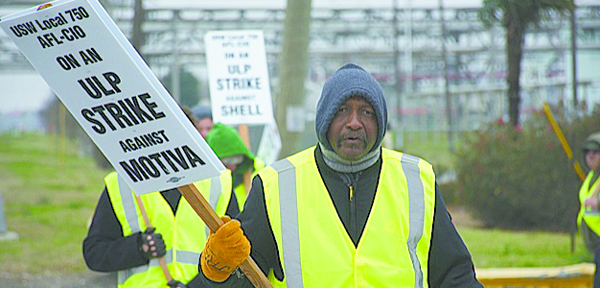
Local union workers at Shell and Motiva refineries in Norco went on strike after negotiations with the petrochemical giant broke down last Saturday, joining the first nationwide oil refinery strike in more than 30 years.
Of Norco Manufacturing Complex’s 1,175 employees, 548 of them are union workers. Statewide, about 800 Louisiana union workers joined more than 5,200 others nationally in a strike that United Steelworker representatives say is about inadequate staffing, worker fatigue and safety issues, which the industry has denied.
“This is all about making sure we protect the workforce and the community and the environment,” said Brent Petit, local United Steelworkers 750 president.
According to Petit, the strike, which began at 11:30 p.m. Saturday, Feb. 21, represents the latest tactic in negotiations to get Shell and Motiva to commit to voluntary, industry-recommended safety guidelines. The standards limit the amount of time maintenance workers in chemical and refining industries operate without time off.
Norco spokeswoman Rochelle Touchard said the company has had manufacturing overtime guidelines in effect since 2008. “From the time API RP-755 was published in 2010, Shell and Motiva have worked diligently to implement and utilize this recommended practice in its operations,” Touchard said.API, or the American Petroleum Institute, recommended the practice, which resulted from the U.S. Chemical Safety Board’s (CSB) investigation of the BP Texas City refinery explosion in 2005. Fifteen people were killed and 170 injured in the incident. CSB issued several recommendations including developing “fatigue prevention guidelines for the refining and petrochemical industries that, at a minimum, limit hours and days of work and address shift work.” API maintained worker fatigue was a contributing factor in the accident and developed guidelines, including RP-755. These include, for example, limiting 12-hour shifts to seven consecutive days with a break of at least 36 hours between consecutive runs.
But Petit maintained, “It’s not uncommon for an operator to work 500, 600 or 1,000 hours overtime in a year, so it’s not uncommon that these operators are averaging over 60 hours per week. It can’t go on like that.
“This is not candy factories—these are some serious oil refineries, chemical plants. You need to have your workforce on top of its game.”
Touchard responded that “fatigue management has been an important part of Norco Manufacturing Complex’s safety culture for many years,” as it has at other Shell and Motiva sites.
In January, United Steelworkers, representing 30,000 workers nationwide, began negotiating with Shell Oil Co., which served as the lead company in national bargaining talks. When talks failed, the strike began Feb. 1, spreading over 12 oil refineries and affecting about 20 percent of U.S. petroleum production. Last Saturday, about 800 Louisiana union workers joined the walkout.
Industry analysts are assessing its potential impact on the U.S. and world economy, although they say recent fuel production has remained constant and at high levels. A 13-cent hike in gasoline prices in the past two weeks was attributed to the strike, as was a refinery explosion last week at an Exxon Mobil plant in Torrance, Calif., according to the Lundberg survey, an independent market research company that covers fuel prices.
Across the U.S., the union represents more than 230 refineries, oil terminals, pipelines and petrochemical facilities in the United States. Of those, 65 are refineries that process nearly two-thirds of the crude oil in the nation.
But Touchard said the strike will not effect production at Shell and Motiva.
“As part of our contingency plans that were developed and implemented over the past 12 months, we have fully trained and qualified Shell and Motiva employees ready to operate our manufacturing sites in the event of strikes or other events that could impact business continuity,” she said. “Our goal is to continue safe and reliable operations as part of the normal course of business and provide quality products to our customers. We are continuing to conduct maintenance activities at the Norco Manufacturing Complex as usual.”
Motiva issued a statement it implemented a plan to ensure the company operates through the strike. Calls to Motiva’s community engagement hotline returned an automated message advising all non-essential employees to work from home if possible.
The contingency plans cover such functions as staffing plans, training, site work scheduling, employee health and safety, site security and environmental management.
Touchard said Norco activated its contingency plans and “conducted a safe and orderly handover of operations at the site from union-represented employees to fully trained and qualified Shell and Motiva employees, who will safely operate the complex.”
The handover occurred at 11:30 p.m. on Saturday, Feb. 21.“The Norco Manufacturing Complex has a long standing practice of creating business continuity plans for our manufacturing sites,” she said. “Over the past several months, a dedicated team has developed site contingency plans to ensure continued safe operation of our sites in the event of a work stoppage.”
Petit said union workers at the two Louisiana plants had “overwhelmingly” voted to authorize a strike late last year.
Reporter Jacob Bielanski contributed to this story.




Be the first to comment